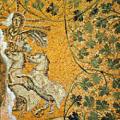108 - George Boys-Stones on the Greek Church Fathers
Posted on
George Boys-Stones joins Peter to discuss philosophy in the Bible and the Greek Church Fathers.
Themes:
Further Reading
• G.R. Boys-Stones, Post-Hellenistic Philosophy. A Study of its Development from the Stoics to Origen (Oxford: 2001).
• G.R. Boys-Stones, "Human Autonomy and Divine Revelation in Origen," in Severan Culture, ed. S. Swain, S. Harrison and J. Elsner (Cambridge: 2007), 489-99.
• G.R. Boys-Stones, B. Graziosi and P. Vasunia (eds), The Oxford Handbook of Hellenic Studies (Oxford: 2009).
• G.R. Boys-Stones, "Time, Creation and the Mind of God: The Afterlife of a Platonist Theory in Origen," Oxford Studies in Ancient Philosophy 40 (Essays in Memory of Michael Frede), 319-37.







Comments
Syriac philosophy and theology
I know the podcast was on the "Greek Church Fathers" but at the end you and Prof. Boys-Stones speak of Greek and Latin as if they were the only languages in which Christian theology/philosophy was being done. Syriac is, perhaps, not as important from a philosophical perspective, especially in the early period, but there could at least be some mention of the polymath Bardaisan and his Book of the Laws of the Countries, and of St Ephrem and his rich ideas on symbols in Scripture and Nature and his use of poetry as a medium for reflection on the Cosmos, a genre akin to some of the Pre-Socratics. I think I heard you say or write elsewhere that you will discuss Syriac in the translation movement of the late Sassanian/early Islamic period, perhaps you could mention it there. Some of my Syriacist friends complain that the scholarship on that movement (esp. Goutas) does not give enough credit to the Syrians as independent thinkers in their own right, rather than simply as translators, something you might want to watch out for.
In reply to Syriac philosophy and theology by Nicholas Marinides
Syriac
Hi there,
Yes, I was just looking at the script for the relevant episode last night, on the Greek-Arabic translation movement. It will be number 122. There I do stress the role of Syriac as an important tradition in its own right though perhaps I don't say as much as I should... it's hard to pack everything in!
Thanks,
Peter
What has Athens to do with Jerusalem?
A brilliant and informative interview! You know all the right people, don’t you?
But do you think the distinction between philosophy and Christianity got a bit sharp at one point, and unnecessarily so?
St Clement likens the unity of knowledge to the unity of virtue. St Justin was wearing his philosopher’s uniform, and, some people say, was practising to the last day and was in fact denounced to the authorities by one of his defeated professional rivals. And what of Eusebius and his “Preparation for the Gospel”? And the “true philosophy” of the Cappadocians and their many associates? I cannot, unfortunately, remember who said that Greek philosophy was the second Old Testament of the Church.
But I do remember that it was St Clement who said that Hellenic philosophy is like nuts, good for you, but cannot be eaten whole. Thank you for shelling it for us!
In reply to What has Athens to do with Jerusalem? by Natalia Doran
Philosophy "vs" Christianity?
Hi there,
Well that's a crucial question obviously. I guess my aim in these episodes (and here I can't speak for Prof Boys-Stones, only for myself) was to separate out as two different questions:
(1) How philosophically interesting are the late ancient Christians?
and
(2) What was the attitude they took towards Hellenic (pagan) thinkers?
As I hope came across my answer to the first question is a resounding "very," but for the second question I got the impression that one needs to answer it one thinker at a time; the case of Clement for instance is vastly different from that of Tertullian. It's interesting too to see how they even appropriate the word "philosophy" and claim sometimes to be doing the real philosophy since they are the ones pursuing the real wisdom (so they call the pagan philosophers "Hellenes" and the like rather than "philosophers," often). To me this whole tension was one of the most interesting aspects of the period when I was writing these scripts.
Thanks!
Peter
In reply to Philosophy "vs" Christianity? by Peter Adamson
Tertullian
Tertullian can speak for the Montanists, if he wants!
He is hightly quotable, but his world-denying tendencies fit more comfortably with Montanus than with Christ.
Add new comment